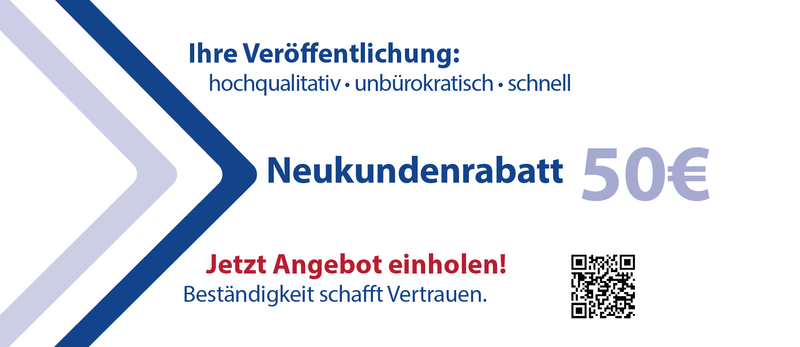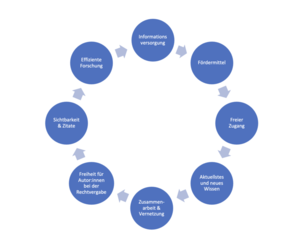
Publish as Open Access
- as an online-only publication (eOnly)
- or with parallel print publication
Are you considering publishing your work Open Access? You will find comprehensive information and answers to the most important questions on this topic below.
What does Open Access mean?
Open Access refers to free access to knowledge. It makes research available free of charge and at any time – both for reading, copying, downloading, printing and referencing.
This includes the following:
- Free (electronic) access to scientific publications and research results
- Barrier-free access to research data – both technically and legally
- The authors are responsible for the rights of use; publishers only receive the necessary “simple” rights of use for the publication of the work.
Advantages of Open Access publication
Publishing a title in Open Access offers various advantages, especially the barrier-free access to research results makes knowledge more visible and usable.
- Easier access to research results
- Higher visibility and impact of research → scientific findings are picked up earlier and made usable
- Easy dissemination of new knowledge
- Promotion of interdisciplinarity and cooperation
- Long-term availability of knowledge (independent of publisher)
- Improvement of knowledge transfer
- Improved access to publicly funded knowledge
- Quality assurance through easier monitoring by other researchers
- Focus on building up research | “duplication of work” is avoided
- Higher chances of gaining knowledge
Advantages for authors:
- Quick and uncomplicated publication process
- Visibility of own research
- Higher citation frequency
- Long-term availability of knowledge (independent of publisher)
- Scientific reputation
Open Access: the golden or the green road?
Whether it’s an Open Access dissertation, an Open Access paper, scientific articles, research data or a habilitation.
Scientists and scholars have two different options for making their research results freely available to society in the form of an Open Access publication:
Open Access for first publications
The golden path refers to the primary realisation of a work as Open Access without prior print publication of the work – also called “Open Access Gold”.
Open Access for secondary publications
The green path is the “traditional” way. In this case, barrier-free access to the digital OA file is established in parallel with or delayed after the (print) publication for which a fee is charged. Depending on your wishes, the implementation of an embargo period is also possible here.
Open Access publication costs
Even if the use of open access publications is free of charge, costs are incurred in the publication process. However, there are a number of publication funds that researchers can access. In contrast to conventional publication, there are no subscription costs for readers, as Open Access titles can be read electronically free of charge.
The preparation of data, the provision of research or marketing activities are partly refinanced in the case of scientific publications without an OA model, e.g. through the sale of licences to libraries. However, both options involve effort and costs. Don’t let your valuable work be forgotten on the university server!
A high reputation, citability & visibility are the elementary aspects for a serious publication in the publishing house. Supporting the transfer of knowledge is a particular concern for us as an academic publisher.
Therefore, we only charge a publication fee of 850€ (net) for an Open Access publication. Of course, this flat rate includes all publishing services such as cover design as well as the assignment of an eISBN.
CC Licence – Open Access at Cuvillier
Publications under the Open Access model are generally published under a Creative Commons Attribution License (CC BY License) in its current version (currently CC BY 4.0). However, our authors are free to choose a different CC license. More information about the licenses.
There are six different variants of the CC licenses, allowing you as the author to determine the extent of usage rights granted to the public.
- CC BY: Unrestricted use with the obligation to credit the author
- CC BY-SA 4.0: Credit must be given to the author; sharing only permitted under the same terms
- CC BY-ND 4.0: Credit must be given to the author; modifications are not allowed
- CC BY-NC 4.0: Credit must be given to the author; no commercial use
- CC BY-NC-SA 4.0: Credit must be given to the author; no commercial use and sharing only under the same terms
- CC BY-NC-ND 4.0: Credit must be given to the author; no modifications and no commercial use
Where to publish Open Access?
Open Access on the university server?
In an open access journal? Or in an open access journal?
Don’t let the reputation of your work and yourself suffer through a short, lengthy and costly appearance in a journal or magazine.
We would like to integrate the content of your publication fully and worldwide into the knowledge community.
This digital visibility is fundamental for the interested public.
Dominating structures through journal publications must not drag the knowledge society into a dependency.
As a leading scientific publisher, it is our responsibility to protect knowledge & research so that independent advances can be written.Scientists deserve appropriate recognition for their research results, which we give you with a professional publication.
With the highest quality standards, your scientific findings will be citable and globally discoverable at Cuvillier, generating reach and visibility as well as supporting the communication flow of science & industry.
Consultation & non-binding offer
You have decided to make a significant contribution to knowledge transfer?
With 36 years of experience and over 10,000 publications in a wide range of scientific fields, the Cuvillier team of experts is at your service.
You will find a complete description of our services under Your path to publication.
Do you have any questions or need advice?
We are available to you at any time in person, by telephone or by e-mail.
You would like to attend the annual conference “Open Access Days”?
Classic book publication or open access publication?
In order to support this flow of knowledge as a publisher, an Open Access flat rate has been established. Costs incurred are covered and authors have the opportunity to make a professional and cost-effective open access publication.








